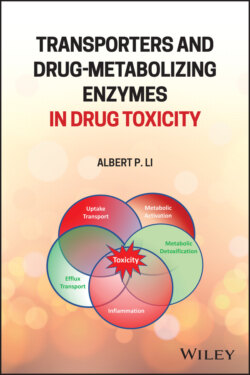Читать книгу Transporters and Drug-Metabolizing Enzymes in Drug Toxicity - Albert P. Li - Страница 41
2.5.7 UGT1A1
ОглавлениеTen of the UGT1A isoforms (1–10) are encoded by the UGT1A gene locus [98]. Currently 113 UGT1A1 variants have been cataloged by the UGT nomenclature committee. The clinically‐relevant variant UGT1A1*28 has an extra TA pair inserted into the (TA)6 repeats in the TATA box [99]. This disrupts the transcriptional regulation of UGT1A1, and thus reduces protein expression. UGT1A1*28 carriers exhibit impaired glucuronidation of lipophilic molecules, including bilirubin, resulting in decreased bilirubin clearance (Gilbert’s syndrome) [98, 100].). It has been associated with the toxicity of the anticancer drug irinotecan [101]. Irinotecan is a prodrug that undergoes bioactivation into active metabolite SN‐38, followed by inactivation by glucuronidation. The therapeutic window of irinotecan is rather small. Patients with UGT1A1*28 alleles could be at increased risk of adverse drug reactions due to its less effective clearance. Some SNPs in the UGT1A locus (e.g. C908G in the 3′‐UTR region) have been reported to be associated with the hepatic toxicity of tolcapone, all of which were in significant linkage disequilibrium with the silent mutation UGT1A6‐A528G [54].
